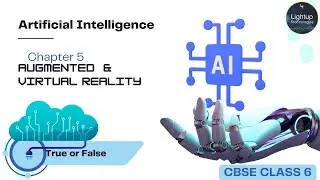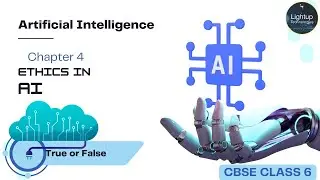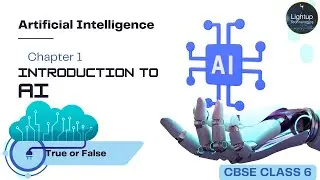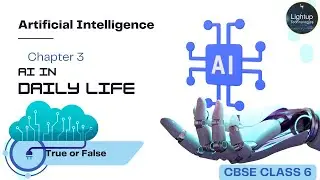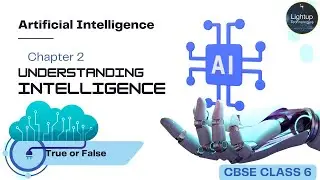CBSE class 6 Artificial Intelligence chapter 4 True or False
Welcome to our in-depth video on "CBSE Class 6 Artificial Intelligence Chapter 4 Practice Questions." In this video, we focus on Chapter 4: "Ethics in AI," a critical and thought-provoking topic that introduces young learners to the ethical considerations surrounding Artificial Intelligence (AI). As AI continues to advance and become an integral part of our daily lives, understanding the ethical implications of its development and use is becoming increasingly important. This chapter is designed to help students explore these ethical issues in a way that is both accessible and engaging, ensuring they grasp the importance of using AI responsibly.
Throughout the video, we delve into the key concepts covered in Chapter 4, starting with an introduction to what ethics in AI entails. We discuss why it's crucial to consider ethics when developing and using AI technologies, especially as these technologies have the power to impact society in significant ways. The video explores various ethical considerations in AI development, such as fairness, transparency, privacy, and safety. These concepts are explained through relatable examples that demonstrate how AI can both positively and negatively affect individuals and communities, depending on how it is designed and implemented.
One of the key topics we cover is the impact of AI on jobs and privacy. As AI becomes more capable of performing tasks that were traditionally done by humans, it's essential to consider how this will affect employment opportunities and the economy. We discuss both the potential benefits, such as increased efficiency and the creation of new types of jobs, and the challenges, such as job displacement and the need for workers to adapt to new roles. Privacy is another critical issue, as AI systems often require large amounts of data to function effectively. We explore the importance of protecting personal information and ensuring that AI systems do not misuse or expose sensitive data.
The video also addresses common myths and facts about AI, helping to dispel some of the misconceptions that students may have. For example, we clarify that while AI is powerful and capable of performing complex tasks, it is not infallible and can make mistakes, especially if the data it is trained on is biased or flawed. We also emphasize that AI is not a replacement for human intelligence but rather a tool that can augment and enhance human capabilities when used correctly.
Another important topic covered in this video is the challenges in AI ethics. We discuss the various difficulties that arise when trying to ensure that AI is used ethically, such as the risk of bias in AI algorithms, the need for accountability in AI decision-making, and the challenge of maintaining transparency in how AI systems operate. These challenges are illustrated with real-world examples that help students understand the complexities involved in developing and deploying ethical AI systems.
To reinforce these concepts, we have included a series of practice questions that align with the CBSE curriculum. These questions are designed to help students apply what they have learned about AI ethics in practical scenarios. The practice questions cover a range of formats, including multiple-choice questions, true/false statements, and short answer questions. By working through these questions, students will be able to deepen their understanding of the ethical issues surrounding AI and develop their critical thinking skills.
We encourage students to actively engage with the video by pausing to answer the practice questions and reflecting on the ethical considerations discussed. This interactive approach not only helps to reinforce the material but also encourages students to think critically about how AI can be used responsibly in their own lives. As they progress through the video, students will gain a clearer understanding of the importance of ethics in AI and how these principles can be applied in real-world situations.
The video also includes discussions on promoting ethics in AI. We explore how individuals, companies, and governments can work together to ensure that AI technologies are developed and used in ways that are fair, transparent, and beneficial to society as a whole. This section highlights the importance of collaboration and the role that students can play in advocating for ethical AI as future leaders and innovators.












